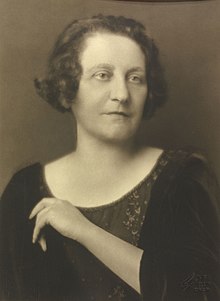Yella Hertzka | |
|---|---|
 Portrait by Georg Fayer, 1927 | |
| Born | Yella Fuchs 4 February 1873 |
| Died | 13 November 1948 (aged 75) Vienna, Austria |
| Nationality |
|
| Other names |
|
| Occupations |
|
| Years active | 1900–1948 |
Yella Hertzka (née Fuchs; 4 February 1873 – 13 November 1948) was an Austrian women's rights and peace activist, school director, and music business executive. She began working in women's humanitarian and social improvement projects in 1900. Co-founding the Neuer Wiener Frauenklub (New Vienna Women's Club) in 1903, she served as its president from 1909 to 1933. From 1904 she participated in the international women's rights movements, supporting women's suffrage and pacifism. In 1919, she attended the Zürich congress of the Women's International League for Peace and Freedom (WILPF). She was a co-founder of the Austrian section of the WILPF, organized its 1921 Vienna Congress, and attended every international WILPF congress held between 1919 and 1948. She worked to free prisoners of war after World War I and during World War II helped those wanting to emigrate or oppose the draft.
In 1903, Hertzka co-founded Cottage Girls' Lyceum with Salka Goldman to facilitate women's qualifying for university entrance or professional training. After completing training in English and advanced horticulture abroad, she returned home in 1909 and established the Villenkolonie Kaasgraben (Kaasgraben Villa Colony), an innovative housing project for intellectuals and artists. In 1913, she co-founded the first school in Austria-Hungary to train women in horticulture and landscape architecture. She directed the school and simultaneously, after 1932 when her husband died, managed the music publishing company Universal Edition until 1938. During her tenure at Universal Edition, she strove to develop new talent, focused in particular on assisting woman musicians and composers.
When the Nazi regime annexed Austria, all of the organizations and businesses Hertzka had been involved in were banned or Aryanized. To facilitate her ability to travel, she married her cousin Edgar Taussig, gaining his Czechoslovakian nationality in December 1938. Emigrating to London for the duration of the war, she worked as a landscape architect and gardener, continuing her pacifist activism. Taussig was murdered in 1943 in a concentration camp. When the war ended, Hertzka chose not to renew her Czech nationality, applied for restoration of her Austrian nationality, and returned to Austria in 1946. She immediately began to re-establish the Austrian chapter of the WILPF and recover her businesses and property. She was appointed administrator for Universal Edition, receiving full control of the business in 1947 despite fighting legal issues with the building owner until her death. Neither her personal property nor her nationality was restored before she died in 1948. The City Council of Vienna established a park in the Seestadt Aspern neighborhood in her honor in 2012.